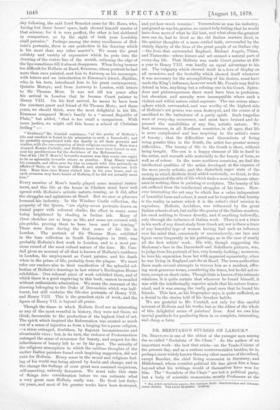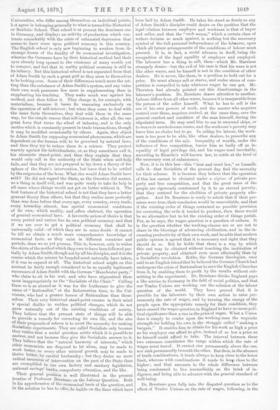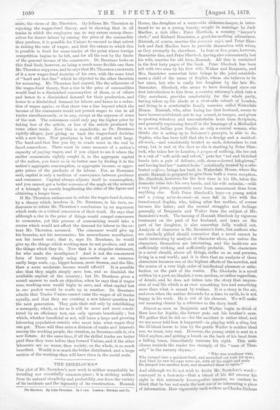DR. BRENTANO'S STUDIES ON LABOUR.*
DR. Eln,NtAxo is one of the ablest of the younger men among the so-called "Socialists of the Chair." As the author of an important work—the best that exists—on the Trade-Unions of the present day, and as a zealous controversialist besides, he is, perhaps, more widely known than any other member of the school, except Roscher, the chief living economist in Germany, and Hildebrand, whose eventful political life 418.8 given him a fame beyond what his writings would of themselves have won for him. The "Socialists of the Chair" are not a political party, but a body of scientific economists, mostly Professors at the * Das Arbeft-rerhallniss gemdss dem heutigen Recht: Geschfeldlichen and Oekonam- fsehen Studien. Von Lit*. Brentano. Leipzig. Universities, who differ among themselves on individual points, bat agree in belonging generally to what is termed the Historical or Realistic School. That school is at present the dominant one in Germany, and displays an activity of production which con- trasts remarkably with the crisis of exhausted depression that seems to have come upon political economy in this country. The English school is only now beginning to awaken from its strange dream of the finality of its economical investigation, whereas the Germans have by their historical method had their eyes already long opened to the existence of many worlds yet to conquer, and feel that in reality political economy is still in its infancy. But this historical school is not separated from that of Adam Smith by such a great gulf as they seem to themselves to be looking over. Some of their differences touch more the set- ting than the substance of Adam Smith's system, and any value their own work possesses lies more in supplementing than in supplanting his teaching. They make much war against his method, and then follow it. They charge it, for example, with materialism, because it bases its reasoning exclusively on the operation of self-interest ; but when they come to deal with the same facts themselves, they deal with them in the same way, for the simple reason that self-interest is, after all, the one great force that turns the wheel of industry, and is the only motive which is constantly present in trade transactions, though it may be modified occasionally by others. Again, they object to Adam Smith for supposing economical phenomena, which are dependent on the human will, to be governed by natural laws, and then they try to reduce them to a science. They protest warmly against his individualistic, or, as they sometimes call it, is atomistic stand-point, and then they explain that they would only call in the authority of the State when self-help fails, and that they are not prepared to lay down a theory of the sphere of the State's intervention, but leave that to be settled by the exigencies of the hour. What else would Adam Smith have said? He did not regard the State, as the Gnostics did matter, as a thing in itself evil, and was quite ready to take its help in all cases where things would not get on better without it. The best feature of the historical school is not that they have a better general theory than others, but that they realise more perfectly than was done before that every age, every country, every trade, every township almost, has special economical conditions of its own, which modify, and. ,.often obstruct, the operation of general economical laws. A favourite axiom of theirs is that every period and nation has its own political economy, and that if we are ever to get a political economy that shall be universally valid—of which they are in some doubt—it cannot be till we obtain a much more comprehensive knowledge of economical facts, as they exist in different countries and periods, than we as yet possess. This is, however, only to widen the skirts of the method which they own to have been followed par- tially by Adam Smith, though not by all his disciples, and it is the course which the science lie founded must naturally have taken, if it was to expand at all. The historical school might on this account be fairly enough considered to be as equally legitimate successors of Adam Smith with the German " Manchester party," who claim to sit in his seat, and who have stigmatised them most inappropriately as the "Socialists of the Chair." Calling them so is as absurd as it was for the Lutherans to give the name of "Rationalist," at the Reformation time, to the Cal- vinists, who had a greater horror of Rationalism than them- selves. Their very historical stand-point creates in their mind a- special dislike to sudden political changes, which do not grow naturally out of the existing conditions of society. They believe that the present state of things will be able to provide a remedy for correcting its own ills, and the aim of their proposals of reform is to avert the necessity for making Socialistic experiments. They are called Socialists only because they realise that a social question exists which it is possible to answer, and not because they give the Socialistic answer to it. They believe that the "natural harmony of interests," which other economists are disposed to let alone, may be made to work better, as every other natural growth may be made to thrive better, by careful husbandry ; but they desire no more radical measures of intervention on the part of the State than are exemplified it our own factory and sanitary legislation, national savings' banks, compulsory education, and the like.
Their general position is well illustrated in the present treatise of Professor Brentano on the Labour Question. Both in his apprehension of the economical basis of the question, and an the solution he has to offer, he builds on the linea which have been laid by Adam Smith. He takes his stand as firmly as any of Adam Smith's disciples could desire on the position that the legal relation between employer and workman is that of buyer and seller, and that the "cash nexus," which a certain class of writers declaim so much against, is nothing but the necessary symbol of the full personal independence of the labourer, upon which all future arrangements of the conditions of labour must proceed. It is, in fact, a social advance in itself,.being the recognition of the legal equality of employer and employed.
The labourer has a thing to sell, then—which Mr. Harrison strangely denies—but the evil of his case is that his ware is not like other wares, and he himself is not in the condition of other dealers. He is never, like them, in a position to hold out for a price. He must always sell or starve, and under stress of com- petition is compelled to take whatever wages he can get. Mr. Thornton had already pointed out this disadvantage in the labourer's position. Dr. Brentano draws attention to another. Labour differs from all other wares, because it is inseparable from the person of the seller himself. What he has to sell is the use of his own powers of work, and the master who acquires control over these, acquires control, at the same time, over the general comfort and condition of the man himself, during the stipulated term. He may send him to sea in unsound ships, or to weave in unwholesome rooms, and the workman's poverty may leave him no choice but to go. In selling his labour, the work- man is too poor to be able, like other dealers, to prescribe any of the conditions of the sale. Inequality of wealth, under the influence of free competition, leaves hisn as badly off as in- equality of legal privilege did, and his wages tend inevitably, according to Ricardo's well-known law, to settle at the level of the necessary cost of subsistence.
Now, it is in this law---this "iron and cruel law," as Lassalle calls it—that Socialists of the present day find the necessity for their scheme. It is because they believe that the operation
of this law cannot be obviated under a regime of private pro- perty. and free competition, and that the great mass of the
people are rigorously condemned by it to an eternal poverty, that they contend for the abolition of private property alto- gether. And Dr. Brentano is ready to admit that if their pre- mises were true, their conclusion would be unavoidable, and that if the existing order of things contained no possible provision for correcting the evils it tended to produce, then there would be no alternative but to let the existing order of things perish.
For, as he says, the wages question is a question of culture. It is the question whether the working-classes are or are not to share in the blessings of advancing civilisation, and in the in- creasing productivity of their own work, and he adds that modern public opinion is agreed that it is necessary and right that they should do so. But he holds that there is a way by which this end may be obtained without touching the institution of private property, and obtained even more effectually than by a Socialistic revolution. Rothe, the German theologian, once said to an English friend that he believed the German Churchhad undergone the crisis of Rationalism to save the English Churches from it, by enabling them to profit by the results without sub- mitting to the experiment. Dr. Brentano thinks England pays a like service to Germany in the field of social politics, and that our Trades Unions are working out the solution of the labour question of the world. They have proved that it is possible for the labourers by their own action to raise per- manently the rate of wages, and by turning the energy of the people upon the appropriate remedy for their condition, they have caused the wages question in Englaud to have no more poli- tical significance than a rise in the price of sugar. What a Union does is simply to confer upon the working-man the requisite strength for holding his own in the struggle called "making a bargain." It enables him to obtain for his work as high a price as his employer can afford to give, instead of as low a price as he himself could afford to take. The interval between these two extremes constitutes the range within which the rate of wages must travel. It cannot rise permanently above the one, nor sink permanently beneath the other. But then, in the absence of trade combinations, it tends always to keep close to the lower limit, whereas with combinations it tends to keep close to the higher ; and that amounts to the whole difference between being condemned to live irremediably on the brink of in- digence, and being able to advance with the general standard of well-being.
Dr. Brentano goes fully into the clieputed question as to the effect of Trades Unions on the rate of wages, following, in the main, the views of Mr. Thornton. He follows Mr. Thornton in rejecting the wages-fund theory, and in showing that in all trades in which the employers can to any extent recoup them- selves for dearer labour by raising the price of the commodity they produce, it is possible for Unions to succeed to that extent in raising the rate of wages ; and that the extent to which this is possible is fixed for some trades at the point where foreign competition begins to be felt, and for all the rest by the limits of the general income of the consumers. Dr. Brentano looks on this final limit, however, as being a much more flexible one than Mr. Thornton supposes, and he says that Mr. Thornton constructs of it a new wages-fund doctrine of his own, with the same kind of "hard and fast line" which he objected to the other theorists for assuming. Mr. Thornton had argued, like the adherents of the wages-fund theory, that a rise in the price of commodities would lead to a diminished consumption of them, or of others and hence to a diminished demand for their production, and hence to a diminished demand for labour, and. hence to a reduc- tion of wages again ; so that there was a line beyond which the income of the consumers would not permit wages to rise in all trades simultaneously, or in any, except at the expense of some of the rest. The consumers could only pay the higher price by taking less of the article, or less of the article produced by some other trade. Now this is manifestly, as Dr. 13rentano rightly alleges, just giving us back the wages-fund doctrine with a new face. New presbyter is but old priest writ large. The hard-and-fast line you try to evade must in the end be faced somewhere. There must be some measure of a nation's capacity of paying wages, and if you object to see it where the earlier economists rightly sought it, in the aggregate capital of the nation, you leave us in no better case by finding it in the nation's aggregate consumption, or aggregate income, or aggre- gate prices of the products of its labour. For, as Hermann, said, capital is only a medium of conveyance between producer and consumer. Capital always adjusts itself to consumption, and you cannot get a better measure of the angle at the summit of a triangle by merely lengthening the sides of the figure and obtaining a longer base.
If Mr. Thornton endeavours to refute the wages-fund doctrine by a theory which involves it, Dr. Brentano, in his turn, en- deavours to refute Mr. Thornton's conclusions by an argument which rests on a virtual concession of their truth. He says that although a rise in the price of things would compel consumers to economise, yet this process of economising would take a course which would not affect the demand for labour to the ex- tent Mr. Thornton assumed. The consumer would give up his luxuries, not his necessaries ; his meerschaum mouthpiece, not his tweed coat; that is, says Dr. Brentano, he would give up the things which working-men do not produce, and not the things which they do. Now that is a singular statement, for who made the mouthpiece P And is not the commonest form of luxury simply using necessaries on an unneces- sarily large scale, e.g., bigger houses, more dresses, and. the like, than a more moderate income would afford P It is possible also that they might simply save less, and so diminish the available capital of the country ; but Dr. Brentano gives a sound answer to such an objection, when he says that if wages rose, working-men would begin to save, and what capital lost in one pocket would be made up in another. Dr. Brentano admits that Trades Unions cannot raise the wages of all trades equally, and that they are creating a new labour question for the next generation. They gain their end only by establishing a monopoly, which, so far as it will be more and more consti- tuted by an efficiency test, can only operate beneficially ; but which, whether beneficial or not, will leave a large and growing labouring population outside who must take what wages they can get. There will thus arise a division of ranks and interests among the working people, the creation, as Brentano calls it, of a new Estate. At the same time, if all the skilled trades are better paid than they were before they formed Unions, and if the other labourers are no worse, then society, on the whole, is so much benefited. Wealth is so much the better distributed, and a large section of the working-class will have risen in the social scale.




































 Previous page
Previous page